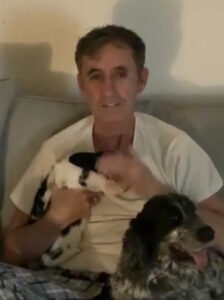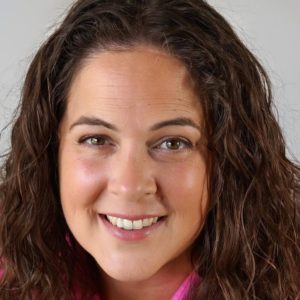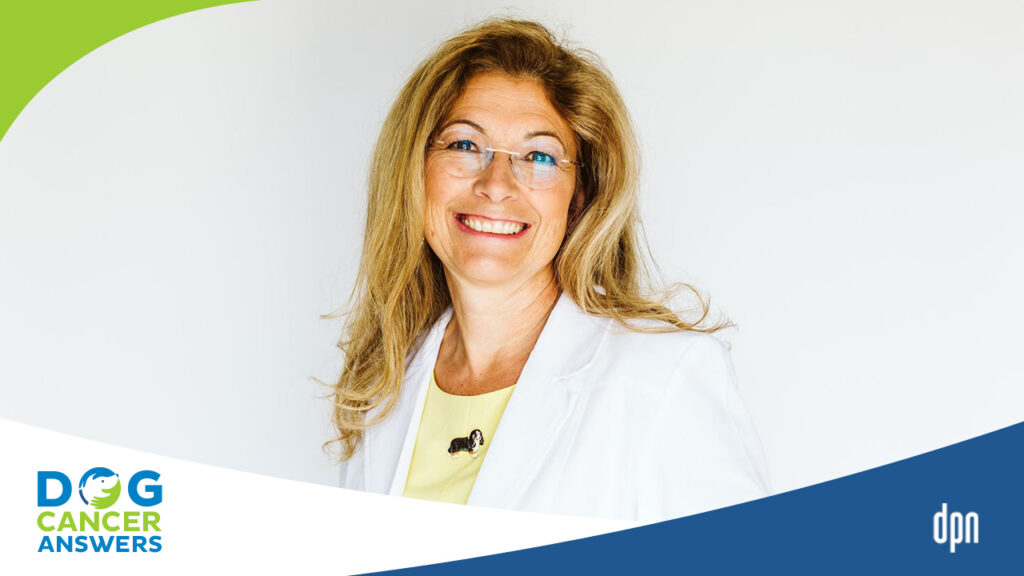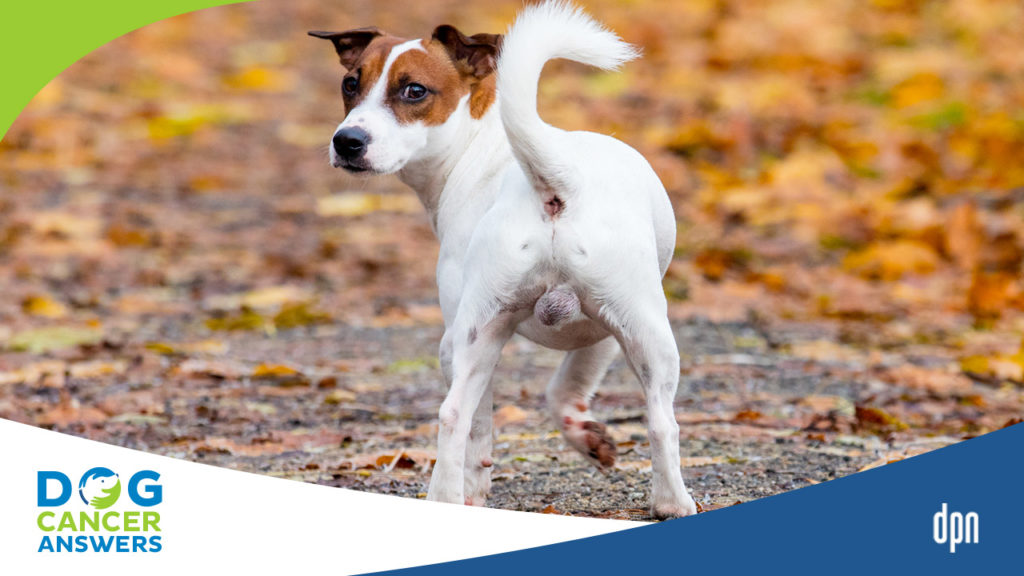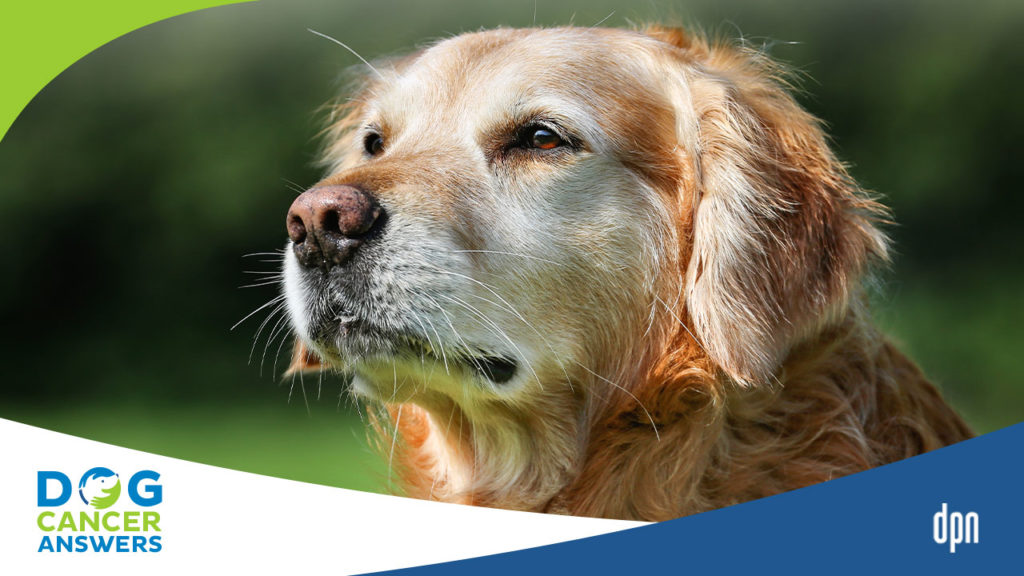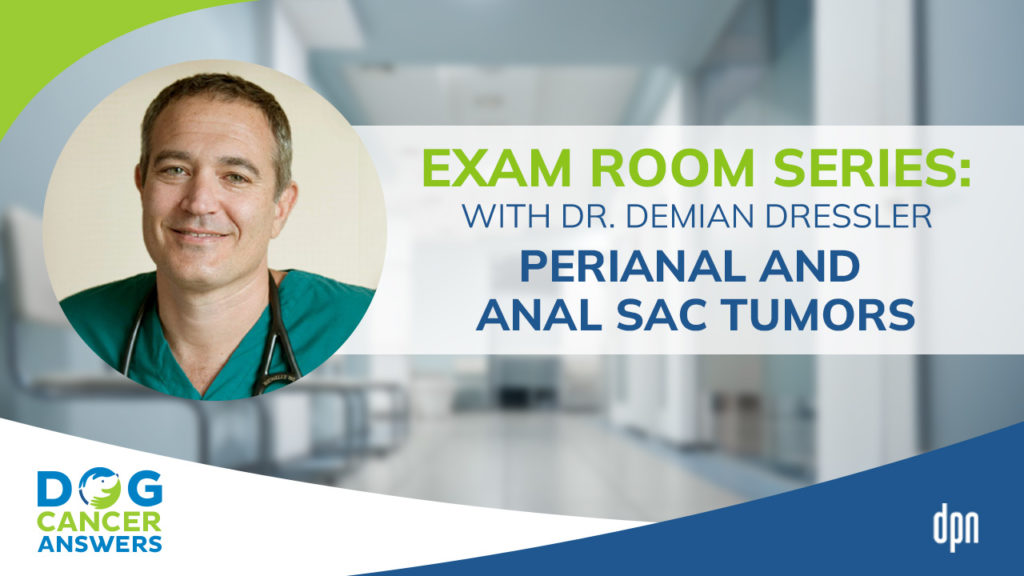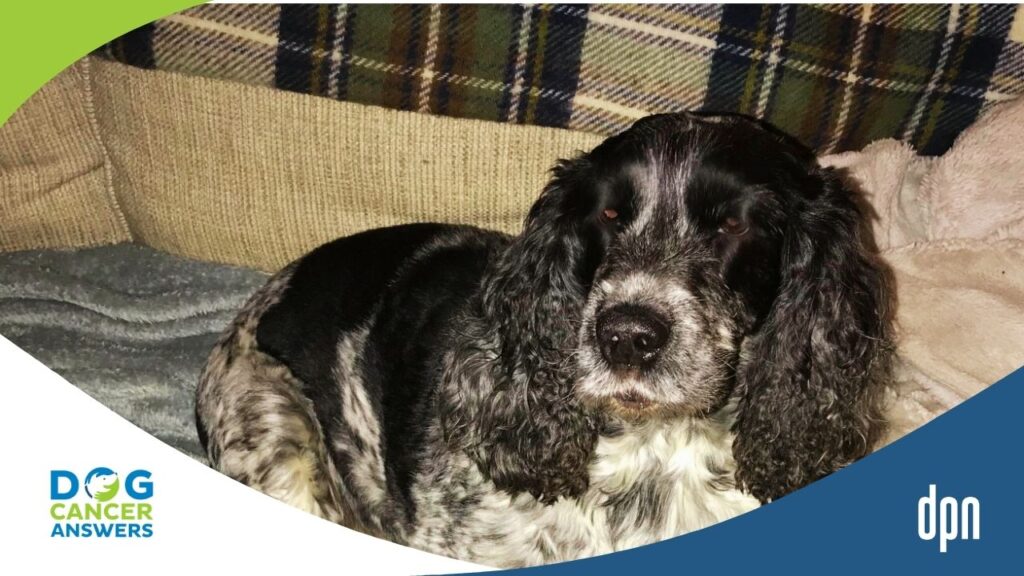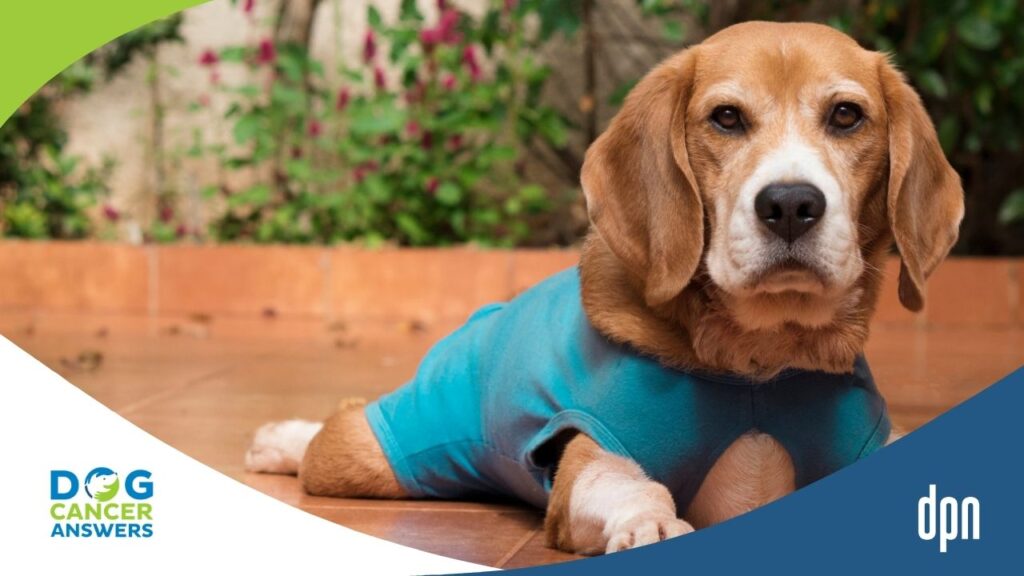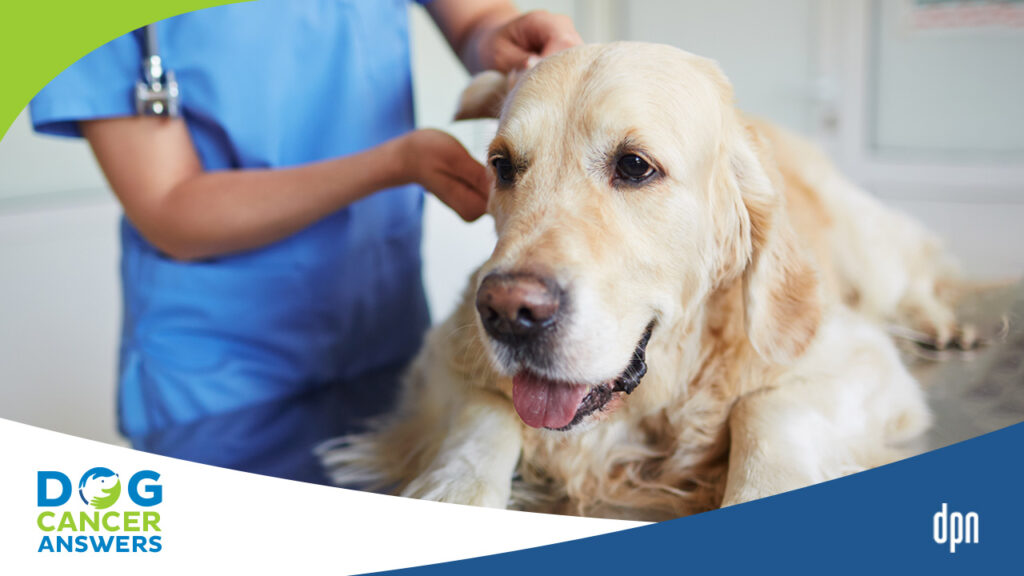EPISODE 208 | RELEASED March 20, 2023
Dog Cancer True Tail: Lilli | John Mcleish
Lilli’s dog cancer success story spans three years, two surgeries, a whole lot of vets, and one really loving human dad.
SHOW NOTES
A lump was first found in one of Lilli’s anal glands in early 2020, right as the world shut down due to the COVID pandemic. Despite many challenges and a few setbacks, her person John was determined to get Lilli the best care possible and to choose a treatment plan that felt right for Lilli.
Listen in to hear how John navigated the difficulties of getting veterinary care in the UK during a worldwide pandemic, and how he found the perfect veterinary care team that was the right fit for both him and Lilli.
And best of all, hear how Lilli is still chasing her ball three years later.
Links Mentioned in Today’s Show:
Dog Cancer Survival Guide https://dogcancerbook.com/
Apocaps https://apocaps.com/
[00:00:00] >> John Mcleish: I live in a village. We’ll walk down five minutes to a field. I’ll open the field door, I will throw a ball and she’ll be off a hundred miles an hour and she’ll catch the ball. She’ll walk two miles around that field.
[00:00:14] >> Announcer: Welcome to Dog Cancer Answers, where we help you help your dog with cancer.
[00:00:20] >> Molly Jacobson: Hello, friend. I’m Molly Jacobson and today on Dog Cancer Answers, we have a True Tail about a dog who has been thriving despite a cancer diagnosis. Lilli is an English Cocker Spaniel living in the UK with her devoted owner, John Mcleish. John has joined us to tell Lilli’s story and how she lives with anal gland adenocarcinoma.
So let’s just go back to the beginning. Tell me when you first noticed something was off with Lilli. What time of year was it? What did you notice? How’d that go?
[00:00:55] >> John Mcleish: I know it. I’ll tell you exactly ’cause I was thinking of it. 2020, February, lockdown.
[00:01:01] >> Molly Jacobson: Oh.
[00:01:01] >> John Mcleish: It was the very day of the lockdown.
[00:01:04] >> Molly Jacobson: Oh my goodness.
[00:01:05] >> John Mcleish: I was in the field and I noticed her scooting really bad and then she had a bit of diarrhea and I always check the poo. Yeah. I used to do it with the hogs and the rabbit, check his poo. I knew then – poo can tell you a lot of things.
[00:01:18] >> Molly Jacobson: Very true.
[00:01:19] >> John Mcleish: So I rang the vet and he says, uh, you can come down, he said, but you’ll wait you’ll wait in the car park and we’ll take Lilli in. This was February 22. Sat in the car park, 20 minutes, half an hour, 40 minutes. I’m thinking something’s wrong here. And then they rang me. Hello John. I says, yeah. She says, uh, got a little bit of bad news for you. She said there’s a bit of trouble in the anal gland.
[00:01:43] >> Molly Jacobson: Oh, no.
[00:01:44] >> John Mcleish: And we, we’ve known, they’ve been emptied several times. We’ve found a little two centimeter growth. Now, it could be malignant or it could be adenocarcinoma. We, that word meant nothing to me at the time. That word haunts me these days. When I read other dogs, when they go on the, on the Facebook, I think what? So they said to me, look, we’re happy to have you bring her in the Wednesday and we’ll give her, uh, test the, what’d you call it? The needle.
[00:02:16] >> Molly Jacobson: Uh, fine needle aspirate.
[00:02:17] >> John Mcleish: Fine needle. Yep. Yeah. So take her home a night. We’ve gave her an antibiotic and she’ll be a bit more livelier. So we booked her in for the Wednesday. I got a phone call on the Tuesday saying we have to cancel the aspirate, we’re now in total lockdown.
[00:02:32] >> Molly Jacobson: Oh, no.
[00:02:34] >> John Mcleish: So they give me a call every few weeks. How’s Lilli, John? I say, she’s okay. I can’t see a lump on the outside. I couldn’t see nothing on the outside. And then, uh, I thought, well, she’s, she’s not acting any different.
[00:02:49] >> Molly Jacobson: Was she still having, uh, bad poops, diarrhea?
[00:02:52] >> John Mcleish: No. No.
[00:02:52] >> Molly Jacobson: Was she still scooting on the ground or?
[00:02:53] >> John Mcleish: Not at all.
[00:02:54] >> Molly Jacobson: Okay.
[00:02:54] >> John Mcleish: Not at all. And, I thought, have they have they got it wrong? And then one day the vet said, we had several conversations, and she said, look, John, it’s a possibility it could be benign. How is she acting? I said like a two year old. Seriously? She’s never, she’s never really.
[00:03:12] >> Molly Jacobson: But how old was she really? She’s acting like a two-year old, but she was?
[00:03:16] >> John Mcleish: At that time she would’ve been 10.
[00:03:19] >> Molly Jacobson: Okay, so 10 acting like a two year old. We’re pretty happy.
[00:03:23] >> John Mcleish: Yeah, pretty happy dog. So September comes and the lot, so we’re in the news a lot. UK was terrible. You must have seen the mess ups they made here. They made big, big serious mess ups with-
[00:03:35] >> Molly Jacobson: Yeah.
[00:03:36] >> John Mcleish: Everything.
[00:03:37] >> Molly Jacobson: Yeah.
[00:03:37] >> John Mcleish: People dying that shouldn’t have died, Molly. Animals dying that should never have died.
[00:03:42] >> Molly Jacobson: Yeah.
[00:03:42] >> John Mcleish: But that’s a, that’s, that’s another debate.
[00:03:45] >> Molly Jacobson: Right. But that’s another podcast.
[00:03:47] >> John Mcleish: That’s another podcast. Let me get on, get hold of some of these politicians. I’ll tell ’em what I think. So in September, things seem to quieten down. They did make their big mistake opening up restaurants and the, the COVID just mushroomed. 70 odd thousand people in a couple of weeks dead.
[00:04:09] >> Molly Jacobson: Right.
[00:04:10] >> John Mcleish: So again, back into lockdown.
[00:04:12] >> Molly Jacobson: And she still hasn’t had a fine needle aspirate. It’s been since February to September and she still hasn’t had an actual diagnosis?
[00:04:21] >> John Mcleish: No, not at all.
[00:04:22] >> Molly Jacobson: Oh my gosh.
[00:04:22] >> John Mcleish: So it goes back in September, they were ringing me up. By this time I’m thinking they must be suffering in business. I thought they must be finding, and I used to joke, I said, why are you phoning me now, is, you need to get some money. I says, look, I’m happy if you are happy and you know perfectly well that’s what, it needs to come out. She says, well, I’m capable of doing it. So we agreed, it gets done. So, uh, I take her down, they’d done the aspirate and they were going to keep her in and they removed the a, a two centimeter tumor.
[00:04:58] >> Molly Jacobson: Okay.
[00:04:59] >> John Mcleish: And, uh, they did say it was a clean margins, however, it could come back.
[00:05:05] >> Molly Jacobson: Right.
[00:05:05] >> John Mcleish: Three days later, they got the results of the tumor: adenocarcinoma. That’s the way you say it, adenocarcinoma.
[00:05:12] >> Molly Jacobson: Adenocarcinoma.
[00:05:13] >> John Mcleish: Adenocarcinoma. It may well come back.
[00:05:16] >> Molly Jacobson: Yeah.
[00:05:17] >> John Mcleish: It might not come back. So that was September, 2020.
[00:05:20] >> Molly Jacobson: And it was two centimeters when they first found it in February of that year, and then it was two centimeters when they removed it. So it hadn’t really grown.
[00:05:31] >> John Mcleish: Hadn’t grown. Hadn’t grown at all.
[00:05:33] >> Molly Jacobson: Okay.
[00:05:34] >> John Mcleish: So got the operation done. Uh, she was fine. A couple of days later she was back out, she was doing her usual thing. And last December, about two weeks before Christmas, I was taking her to the groomers. I picked her up, I put her in the car and I felt what she was, I thought a bit of fur, and my mind thought, no, I’ll get her groomed and have a look. And I could see a lump coming out the side of her right anus.
[00:05:58] >> Molly Jacobson: Okay.
[00:05:59] >> John Mcleish: So I phoned the vet up. The vet said, There’s nothing to worry about. She said, she’s had the operation way back the year before.
[00:06:06] >> Molly Jacobson: Okay.
[00:06:07] >> John Mcleish: And I thought, no, I’m not accepting that as an answer. There’s something there. Bring her in Wednesday. I went down on a Wednesday, lifted up her tail, I said, There, it’s there. I could see it clearly. It was a few centimeters. And she said, it looks like it. I’ll do an aspirate. And then she says, uh, I’ll let you know Friday. Now we’re heading into the Christmas week. If it is, she said, I’ll get her fitted in before Christmas. So get the bad news again on the Friday.
However, bring her in on Monday and we’ll do the operation. Took her on the Monday, done the operation, and uh, this is when it gets a bit, a little bit complicated now because we’re back into lockdowns again.
[00:06:50] >> Molly Jacobson: Okay. So this is the end of 2021. You know that she’s got a recurrence of adenocarcinoma.
[00:06:57] >> John Mcleish: Yeah.
[00:06:57] >> Molly Jacobson: This is the second surgery to take it out. Have they looked for metastasis yet?
[00:07:00] >> John Mcleish: Right.
[00:07:00] >> Molly Jacobson: Have they done scans?
[00:07:01] >> John Mcleish: So I was told to bring her back four days later to get her stitches out. I pulls into the car park and you’ve got to call them and tell ’em you’re here. And this young vet came out and it was raining and he says, right, you lift her tail and I’ll take her stitches out.
[00:07:16] >> Molly Jacobson: Oh, right in your car?
[00:07:17] >> John Mcleish: Yeah, outside in the car park. I thought, no. You are over the twentieth veterinary guy I’ve seen in here in the last few months. I can’t take it no more.
[00:07:27] >> Molly Jacobson: Oh, it’s so hard.
[00:07:28] >> John Mcleish: I says, I’m not letting you take stitches out in the car. Take her inside the building. I’ll wait here. And he came back out, he says, oh, they’re a bit tender still. Can you come back Friday? So I seen the vet on the Friday who performed the operation, and she says to me, yeah, I’ll get the stitches out. She says, and then, pop back next week and we’ll just check it as the, the wound’s healing. And she never told me nothing else. So I went back the following week and I seen a young girl, 26, I can’t remember her name, and she said to me, uh, yeah, she’s looking well, I’ve took her stitches out.
She said, but did you get the bad news from the vet? I won’t mention her name. Well, Marianne. Marianne just said that she took her stitches out and that was it. She said, well, we’ve found some metastatic cancer in the sublumbar nodes.
[00:08:21] >> Molly Jacobson: They’d done scans, and they didn’t tell you that they were doing scans?
[00:08:24] >> John Mcleish: No.
[00:08:25] >> Molly Jacobson: So you didn’t know that bad news was coming or any news was coming.
[00:08:28] >> John Mcleish: Yeah. So I says, uh, well what can we do? I mean, I’m standing in the car park and I felt sorry for her ’cause uh, like most of these young vets, they love animals. They go to university, they get a degree. And before they know it, they’re working in these veterinary places who have been bought out by companies who are looking for return on investments, and they just want these vets to go through as many animals as they possibly can.
That’s how I see it today. And, uh, I said, well, what, what is the next move? She says, well, really, I’ll have to speak to your vet and see if we can dampen it down. That was the words she used. Dampen it down.
[00:09:09] >> Molly Jacobson: Dampen it down.
[00:09:10] >> John Mcleish: So I gets in the car and I thought, I can’t have this. And I I started on the net and I came across the book by complete accident.
[00:09:18] >> Molly Jacobson: The Dog Cancer Survival Guide.
[00:09:20] >> John Mcleish: And something drew me to it and I read a few pages and I bought it straight away. And I thought, these people know exactly what they’re talking about. So instead of starting reading a book from beginning to end, I started jumping in where it was with, you know, Lilli, but then I went back again and I still keep on coming back. It, it gets read most days, Molly, to be honest with you. I’ll go back, I’ll pick up something maybe on the internet and then I’ll have a look back through there and see what Dr. Dressler says, et cetera. Knowing it’s been, it’s been an interesting journey.
[00:09:54] >> Molly Jacobson: Yes. That’s one way to put it.
[00:09:56] >> John Mcleish: Yeah. Paid the express, got that, and I thought, right. Back on to the vet, I says, I want to see a specialist. I said, uh, you can’t dampen it down. Well, I’ve actually spoke to someone at The Willows and he said he could do these operations with his eyes closed. I said, well, he must be a very good surgeon because it’s right next to the aorta. I’ve looked at the structure of the dog. I said, it’s very close to two arteries. I says, uh, but I’m willing to go. Can you get me booked in? Let me see what I can do.
Two weeks later, they’re not seeing anybody for four months. She said they’re only seeing emergencies only. And I thought, right. So the Marianne vet rang me up, she knew I wasn’t happy, so she must have went to her super, Marianne, her supervisor, and she came back and says, look, I’ve found somewhere else, but you’ll need to go as soon as they tell you to go. And I, I got a call one morning, couldn’t believe it. Is that John Mcleish? Yes.
You’ll have to get down here tomorrow morning at nine o’clock. She said the fee’s 295 pound. I said, who? Who’s this? Is this someone I do business with? She says, uh, we are a referral center for Lilli and can you ask your vet to send all the details down. And I said, I’ll be there. She said the fee’s 295, she says, and then we take it from there. And uh, that’s how I started on the referral route. And that was back in January.
[00:11:26] >> Molly Jacobson: Of this year, 2022.
[00:11:28] >> John Mcleish: Yeah. So I mentioned, I told this vet, I’m using the Apocaps. Well, she was American actually. She says, yeah, I’ve heard of them. She says, uh, but you you ought to be doing chemotherapy, radiotherapy. She says, right, well, what we’ll start with, well, we’ll start with chemotherapy. I say, mm, that’ll be 5,000 pounds, right? You are insured. I says, yeah, but this is the second time Lilli’s had this. I’ll need to pay this myself, because the insurance company stopped after, you know, if your dog breaks their leg and it breaks it again, then you pay for that again.
[00:12:06] >> Molly Jacobson: Okay.
[00:12:06] >> John Mcleish: And then we’ll go on to radiotherapy, which could be 7,000. So we’re now up at 12,000. So we’re piling up money, molly, without any – Lilli’s lying sleeping, and I said, I’ll speak my mind sometimes, Molly, when I have to, but don’t forget when people like myself are sitting in that situation, you are getting overwhelmed. Now, she had the scans in front of her, the scans that were done two weeks ago, so she knew where the lymph nodes metastasis was.
So I, I did say to, I’ve got a few questions. So she said, so leave Lilli here today, and what we’ll do, we’ll knock a few hundred pounds off the bill and we’ll use the same sedative to scan her and then scan her legs. And I said, I don’t want to leave her today, because I was shocked. I was so overwhelmed.
And I thought, when is she going to actually examine her? She said, have you any questions, I says, yeah, I would like you to have a look at her. So Lilli got up and she patted her side. She said, yeah, little bit of fat here. Opened her teeth up. Yeah, she said, she looks well. Uh, I says, good. So I said, well, I’ve got a few questions for you.
I’ve got some more questions for you. She says fire away. And I said, first of all, you got all the, my own vet to send you her complete history. And the last thing on the history was the, the paw where she jumped out the car. I says, and really, we’ve spent a lot of time discussing the paw and not the metastatic cancer.
I do apologize, but you’re still leaving her today. I says, no, I’m not. I’m going to go away and I’m going to think. Well, I wouldn’t leave it too long. I says, well – I was getting a bit, when when you’re in that situation, you’re in two minds. Do I leave her? Don’t I leave her? I just got a, I didn’t get the right feeling.
I said, well in front of you – ’cause I stood up by this time – you’ve got her scans there, which were done two weeks ago. Now surely these scans haven’t changed in two weeks. Yeah, it could do, she’s an older dog, don’t forget. I thought, right, okay. I, I’m still not too sure what to do. I’m glad I had a mask on because the tears were rolling down my face, I was getting blocked up.
[00:14:28] >> Molly Jacobson: You were really upset.
[00:14:29] >> John Mcleish: And, uh, I said, I’ll need to think about this. I’ll really need to think what I’m doing. And I said, the money isn’t a question. My dog’s health is. Lilli’s 11 at the time. To put her through the chemotherapy, the radiotherapy, I’m thinking selfishly of my own.
I said, I’ve got two other pups as well. I say, she gets on with them. I say, she’s not been showing any signs, I say I’m surprised after the operation two weeks ago that she’s lively as she is. Right. Let’s do a blood test. So I says, right, I, I gave in. I said, do a blood test, because by this time I wanted out. And, uh, she said, I’ll, I’ll do the blood test then.
And then she come back and she says, right, you still don’t want to leave her? I says, definitely not. I got in the car and I drove about 40 miles and I don’t know how it was my, I’m driving on a motorway. I was my, just, oh. And uh, I’ll be honest with you, both of you, she wasn’t happy that I took Lilli away. I could tell.
I could tell. And when I got to reception, she says it’s 295 and 350 for the blood results. So the blood results come and they were exact same as they were in December. So the director of the vet company who I go to, Ian his name is, I knew when he was on and when he was open, when he was quiet, and I rang him the next night at quarter past seven. And fair play, he gave me an hour and a quarter of his time. I explained everything that I explained to you. And Ian, the vet director, said, it’s disgraceful that she done a blood test. They’ve just took you for another 350 pound. He said, I appreciate you, John. I’ve gotten to know you as a human being and not just somebody that brings his dog in. He says, you’ve put a lot into Lilli. You’ve put a lot in – I’ve spent thousands on Huggsy on his teeth.
[00:16:33] >> Molly Jacobson: Huggsy is your rabbit. God rest his soul, but.
[00:16:35] >> John Mcleish: He passed away last, uh, last February. Yeah, he was eight.
[00:16:39] >> Molly Jacobson: Eight, okay.
[00:16:41] >> John Mcleish: Eight year old. Yeah, he was, he was funny. I’ll show you some pictures. He’ll, he was unbelievable. So, Ian, he wrote to the referral center, but the referral center wrote back to him and here is what they said. They’d only suggested that I do a blood test. So she covered herself right away. If he doesn’t want to spare, pay the 19,000 pound, we can offer lesser chemotherapy. Palladin, pa, pala, pala?
[00:17:14] >> Molly Jacobson: Uh, Palladia. The at home chemotherapy pill.
[00:17:17] >> John Mcleish: Palladia.
[00:17:18] >> Molly Jacobson: Uhhuh.
[00:17:18] >> John Mcleish: Yeah, we can do that, we can do this. So I thought, Ian, my mind’s made up. I’m not putting her through chemotherapy, radiotherapy. I am just not going that route because the way I feel now, Lilli’s 12 this year. She’s too old. Her body wouldn’t be able to take it. And I just thought, no. What I’m going to do, I’m doing the Apocaps, CBD, fresh chicken, fresh steak, the best of meat. I would rather spend 19,000 pound on food for a dog than put 19,000 pounds worth of chemicals into the dog.
[00:17:57] >> Molly Jacobson: Now, sometimes chemotherapy is the right choice, you know, for dogs, for some people.
[00:18:02] >> John Mcleish: Yeah.
[00:18:02] >> Molly Jacobson: But sometimes it’s, it’s not.
[00:18:04] >> John Mcleish: Molly, I think if Lilli was two or four, I would’ve went the chemotherapy route. I wouldn’t have gave it a second glance. But I thought at her age, and then when I seen a few people would say to me, we had dogs, John, 10, 11, and once we started giving them chemotherapy, radiotherapy, it killed them.
[00:18:25] >> Molly Jacobson: Mm. Yeah. And I have to say, just for the listeners who are in chemo or radiation or, or are thinking about it, that typically the dogs can do well, but it really is an individual decision and it’s an individual decision for dogs. I’ve had dogs that I would happily do chemotherapy or radiation with, and then another dog who in, at the same age with the same diagnosis, I would not have, just because of all sorts of individual, dog based or cancer based decisions.
[00:18:56] >> John Mcleish: Yeah. Yeah.
[00:18:57] >> Molly Jacobson: So, but in your case with Lilli, just, she’s 12 and it was too much. And it sounds to me, and I, I might be wrong about this, John, but it sounds like you also just like, really didn’t like this referral vet.
[00:19:12] >> John Mcleish: I didn’t. I was, I was very-
[00:19:13] >> Molly Jacobson: That maybe played into your decision a little bit.
[00:19:16] >> John Mcleish: It was in a room, Molly. There was no windows. There was over 200 specialist vets in this building. Orthopedic surgeon, heart surgeons. I got the impression it was like a conveyor belt.
[00:19:31] >> Molly Jacobson: Uhhuh. It just didn’t feel warm and-
[00:19:34] >> John Mcleish: Did not feel right.
[00:19:35] >> Molly Jacobson: It wasn’t right for you and for Lilli.
[00:19:37] >> John Mcleish: It was not right for me. Now, if I went maybe to Willows or Fitzpatrick’s, they’ve got a good name in the UK, chances are, slim chances, I would’ve maybe, perhaps would’ve done the chemo. But I’m glad that I didn’t do it.
[00:19:58] >> Molly Jacobson: Yeah. I’m not questioning your decision, John. I’d never do that. No.
[00:20:01] >> John Mcleish: No. I’m glad that I got enough information out of the dog cancer guide book than I’ve had off of vets. It’s gave me hope. It’s gave Lilli hope. I tell everybody about it. You know, people think I’m mad, but the sad thing, the sad thing is sooner or later, she won’t be here.
[00:20:25] >> Molly Jacobson: Yeah.
[00:20:26] >> John Mcleish: I said to that vet as well, before I left, I said, I’ve got, I’ve got, uh, she said you got any questions? I says, I have. I said, uh, how long has Lilli got left? And she says, on the downside, nine months. On a good side, 14 months.
[00:20:46] >> Molly Jacobson: That’s more time than many dogs are given, but it’s of course, still far too short for any dog lover. We’re going to take a short break and then when we come back I want to hear what you and Dr. Ian decided to do for Lilli.
And we’re back with John Mcleish telling us the story of his dog, Lilli. So the oncology consult didn’t go so well and you went back to your favorite vet to regroup, what happened next?
[00:21:13] >> John Mcleish: So Ian says, I get the impression, John, you are thinking of the dog’s health more than your own health, and you’re not being selfish. He says, now, Lilli’s had this for two years, John. He said it’s very, very slow. It’s slow. It could speed up. It could, we don’t know. He says, uh, what would you like to do? He says, now I will say to you, where the, uh, two lymph nodes are that are infected, they’re very close to the caudal artery.
[00:21:47] >> Molly Jacobson: Ah.
[00:21:47] >> John Mcleish: And the aorta. He said, it’d take a very experienced vet with a lot of years’ experience to go in and get them out without cutting an artery. Cut an artery, finished.
[00:22:00] >> Molly Jacobson: Yeah, that’s a very risky surgery.
[00:22:02] >> John Mcleish: He said very risky. He says, so we’re, we’re now looking John, is we’re looking at all Lilli’s history. He says, uh, I’m going side with you. He said, because you need to come back every six or eight weeks to get the other anal gland emptied. I thought, right. Okay then. He said, well, if we see any change then maybe we can do something else.
So two months passed. I went down to see him and I said, asked, I’m specifically asking for you because the turnover in vets in the UK Molly is unbelievable. Uh, the highest suicide rate in the UK, veterinary surgeons last year.
[00:22:39] >> Molly Jacobson: Same in the US. I don’t know if they were the highest in the entire United States, for veterinary surgeons, but, but we have a terrible, terrible crisis in the veterinary health professional community here as well.
[00:22:51] >> John Mcleish: Unbelievable.
[00:22:51] >> Molly Jacobson: They’re under so much stress. They are so, so overworked and-
[00:22:56] >> John Mcleish: Yeah.
[00:22:57] >> Molly Jacobson: There’s a lot of need that they have that we’re not aware of as, as people.
[00:23:02] >> John Mcleish: Unbelievable.
[00:23:03] >> Molly Jacobson: Yeah.
[00:23:03] >> John Mcleish: So you’re aware of that?
[00:23:04] >> Molly Jacobson: Yes.
[00:23:04] >> John Mcleish: So I said, well, what we’ll do, we’ll bring Lilli in every two months, six to eight weeks, ’cause that’s when she gets her anal glands, were getting emptied then. And uh, two months passed, I went down and he said, what have you done? I says, what do you mean, what have I done? He says, John, I expect to see a difference. I said, well, I’ll tell you what I’ve done, and I have mentioned in previous conversations.
[00:23:28] >> Molly Jacobson: He meant she’s stable and he was expecting to see the anal gland tumors progressing?
[00:23:34] >> John Mcleish: Yeah, he, he thought she was going to go down the hill.
[00:23:37] >> Molly Jacobson: But she hadn’t. She was just the same.
[00:23:39] >> John Mcleish: Yeah. I said, Ian, I’ve mentioned to you, I’ve mentioned to oncologists, I’ve mentioned to the veterinary girls, young, 26, 27 year old vets, Apocaps. No one’s heard of them.
[00:23:51] >> Molly Jacobson: Dr. Dressler’s supplement. Yeah.
[00:23:53] >> John Mcleish: Well, what’s that, he says.
[00:23:54] >> Molly Jacobson: His, his formula.
[00:23:55] >> John Mcleish: What’s that? So I explained it to him. He says, oh, are you using that? I says, yeah, I said, and I’m also using CBD, ’cause I used to manufacture CBD in, in Los Angeles when I brought back to the UK. I said that I’ve cut out kibble. So he said, well, keep doing what you’re doing, John, he says, and I’ll see in another couple of months. So another two months passed and uh, he said the paw is fine. He said, uh, there’s a little bit of slight raise in the, uh, lymph node, but of no concern. So three weeks ago we were back for, that would be the third time since January.
[00:24:37] >> Molly Jacobson: January of this year, it’s October, 2022. And January of 2022 is when you saw your vet, this Ian vet for the first time.
[00:24:46] >> John Mcleish: See the first operation, September ’20, that was the first tumor gone, and then it came back at the end of ’21.
[00:24:54] >> Molly Jacobson: Okay.
[00:24:55] >> John Mcleish: And then they removed it in December ’21.
[00:24:58] >> Molly Jacobson: Okay.
[00:24:58] >> John Mcleish: And then, uh, since then, I go back every, as I said, it could be six weeks, it could be eight. I know when I see the scooting, I pick her up and we go down and we see Ian, he’ll empty her glands. So we’re there three weeks ago, so I said, how are we now? He says, John, she looks good. She’s actually 14.2 kilograms. She’s putting weight on.
[00:25:22] >> Molly Jacobson: Oh, wow.
[00:25:23] >> John Mcleish: Which is another boost really. He says the lymph nodes on the last, we’ve seen you two months ago, it’s just a little bit large. He said, but as time goes on, it will get bigger and my concern would be it may press on the spine.
[00:25:40] >> Molly Jacobson: Ah-huh.
[00:25:42] >> John Mcleish: But we might be able to do some debulking, or I might give you, like a laxative, make her poo smooth. I says, well, Ian, I’ve been using Glandex that I found off a Cocker Spaniel breeder way back last year. She moved back from Australia with her dogs to the UK and she mentioned Glandex, and I gave Lilli two Glandex a day, one with her breakfast and one in the evening.
[00:26:10] >> Molly Jacobson: And that’s been taking care of the, the poo.
[00:26:13] >> John Mcleish: Yeah.
[00:26:14] >> Molly Jacobson: So she’s doing well.
[00:26:15] >> John Mcleish: Yeah. Yeah.
[00:26:17] >> Molly Jacobson: Is, today in mid-October 2022, when you look at Lilli, does it feel like she has cancer?
[00:26:24] >> John Mcleish: The only telltale signs really – she doesn’t look like she’s got cancer. I know she’s got it.
[00:26:31] >> Molly Jacobson: Of course.
[00:26:32] >> John Mcleish: And I see her, I’ll give you an example. I live in a village. We’ll walk down five minutes to a field. I’ll open the field door, I will throw a ball and she’ll be off a hundred miles an hour, and she’ll catch the ball. She’ll catch the ball. She’ll walk two miles around that field. But by the time we come up the field, you can tell she’s an old dog. She’s slow. She’ll come in, she’ll look for her treats and she’ll have her sleep. And then I give her a wee third meal in between, I give her some salmon oil, CBD oil, and a little bit of chicken about one o’clock.
Two o’clock, she’s back out in the church yard running about chasing balls.
[00:27:18] >> Molly Jacobson: She just needed a little nap.
[00:27:19] >> John Mcleish: Half past four, she’s done what she’s done this morning. She’s out chasing balls, carries the ball two miles back to the house.
[00:27:28] >> Molly Jacobson: Oh my goodness.
[00:27:30] >> John Mcleish: Now, before we came on here, I was away on business. The day I came back, my friend looks after her, she brought her back, she said she’s really great, John, where does she get the energy? She’s been out for four hours with six other dogs, and she’s had a good nap this afternoon. I haven’t fed her because I know you’re on special diets with her. So I got the steak out, I got the chicken out already cooked, steak cooking, and some vegetables, and we went over to the church yard about quarter past seven before this time. Had a little wander and now she’s lying as you can see her.
[00:28:07] >> Molly Jacobson: Yeah. It’s been a good day.
[00:28:09] >> John Mcleish: Yeah.
[00:28:09] >> Molly Jacobson: She’s taking her rest at the end of a very good day.
[00:28:12] >> John Mcleish: Yeah.
[00:28:12] >> Molly Jacobson: It sounds to me like you know she has cancer, but no one else would know by looking at this dog.
[00:28:19] >> John Mcleish: No.
[00:28:20] >> Molly Jacobson: This is an amazing story.
[00:28:21] >> John Mcleish: But what I’ve got to stop doing is I worry about – my, all my friends tell me, you spend too much time, you look more ill than Lilli looks. I’m I’ve lost a lot of weight ’cause I worry about her.
[00:28:33] >> Molly Jacobson: Yeah. This is a really important thing I wanted to talk to you about actually, because Lilli is clearly an amazing dog, and you have worked so hard on helping her through this. You’ve done so much and been such a fierce advocate during extreme – dog cancer is terrible to navigate to begin with. Navigating dog cancer during a worldwide pandemic when you can’t even be in the room with the veterinarians as they examine, do the fine needle aspirate, take the blood test, whatever it is that they’re doing, you’re not there with her? This is very stressful.
So your stress levels have been, as many of our listeners have also been, extreme and through the roof. And I really wanna congratulate you on navigating that with relative grace and ease, and also really sticking by your guns in terms of your own intuitive feeling about who you trust and how you wanna work, and that you found the right vet and you kept going. And finding the right relationship, I think, is one of the most important things that we can do as dog lovers, is to put together a team that we know we have confidence in.
Because the worst cases, in my experience, are the ones where someone afterwards feels like they made decisions based on half information or not enough information, or they didn’t ask the right questions or asked the wrong questions because they didn’t trust their team. And so I just really want to congratulate you on really making sure that you trusted your team. Whatever that means for the listener, that importance of working with someone who really vibes with you and your dog is so important.
[00:30:23] >> John Mcleish: Yeah, it’s so important.
[00:30:25] >> Molly Jacobson: Yeah. So yay on that. And then I wanna ask you about how you are managing your own personal stress, because I mean, you’ve been reading Dr. Dressler’s book, but did you read the chapter on how important it is to take care of yourself?
[00:30:39] >> John Mcleish: Yes.
[00:30:40] >> Molly Jacobson: Okay, good.
[00:30:41] >> John Mcleish: Yes. But I do what most humans would do, and they’d say, yeah, I’ve gotta do that, I’ve gotta look after myself. And 10 minutes later, my focus is back with the dog again.
[00:30:49] >> Molly Jacobson: Yes, exactly. Exactly. I wonder what your best advice is for others who have a dog cancer diagnosis. Like what do you wish everybody knew?
[00:31:00] >> John Mcleish: First of all, I would recommend the book. That is a priority. And Apocaps, a priority. Then, on top of that, Molly, as well, you get the odd thing that will say, oh, this is all about Dr. Dressler making a fortune on Amazon selling Apocaps. I’ve picked a few comments like that up. So I thought, no. I can tell, I can tell by looking at both of you how you are as individuals. When people are talking like this, we’re not just talking, we’re sharing from the heart.
What I’m saying tonight is coming from my heart, not my head. And what I’m seeing, I know what’s coming back. Like spirituality, call it whatever you like, the vibration’s good. So I, I had to look at these few people that were making out, no, no, don’t buy that book, it’s don’t do this, and don’t do that. Try this book. Try that book. Well, I did. I thought I’ll spend six pounds, seven pound, get a book. Absolute waste of time. They had nothing in it at all, no value.
And I thought if people would only just latch onto – any dog with cancer, any dog with cancer, and read that book and take every piece of information that you can get, whether it means sitting down on a Saturday afternoon when you’ve got half an hour or an hour and you’re bored and you are looking for something to do. I’ll always open that book up and I’ll see something that I might not, I might have seen it a few months ago, I’ll see it in a different light and I’ll think, right. Hmm. Let’s try this. Because it’s so – how long did the book take, Molly, to write?
[00:32:37] >> Molly Jacobson: Oh my goodness. Well, Dr. Dressler researched it for years, worked with people in his clinic for years, took him at least a year to write it, the first edition, and then two, three years to do the second edition. And, um, yeah. And we’re currently working on updating this, that edition right now, and it takes a tremendous amount of work and lots of people are involved.
It’s not just Dr. Dressler and Dr. Ettinger, you know, it’s all of these other veterinarians who review it and help to do the thinking and yeah, no it’s a lot of work that’s, frankly, they’re not compensated for in any – royalties are not an earner.
[00:33:21] >> John Mcleish: And I think people like myself, Molly, as well, now we do, we do, we do a lot of worrying about our animals. We, we are animal lovers. And I might read a passage, you know, and I’m not sure I’ll forget about it in two days time, but if I read it again, maybe in two or three weeks’ time, it’s a whole ball game – it’s as if I’ve seen it for the first time.
[00:33:41] >> Molly Jacobson: Yeah.
[00:33:41] >> John Mcleish: It starts hitting the head. Now let’s try this now. Now, I didn’t see much about mushrooms in the book.
[00:33:48] >> Molly Jacobson: They’re in chapter 13. Dr. Dressler talks about mushroom derived polysaccharides.
[00:33:54] >> John Mcleish: Right.
[00:33:54] >> Molly Jacobson: Starts on page 182. So today it’s more common to call them medicinal mushrooms.
[00:34:01] >> John Mcleish: Right.
[00:34:02] >> Molly Jacobson: And he also talks about cordyceps-
[00:34:04] >> John Mcleish: Cordyceps.
[00:34:04] >> Molly Jacobson: -in Chapter 11 as a really good supplement for dogs who have heart problems as a result of chemo.
[00:34:13] >> John Mcleish: Lion’s Mane.
[00:34:15] >> Molly Jacobson: Yep. Those are mentioned in, uh, in Chapter 13.
[00:34:18] >> John Mcleish: There’s quite a few. And Apocaps, I’ll give you my experience on them and my experience has been they work and they work well. They work well. She takes two in the morning, she gets two at night. She’s never had any upset stomachs. Nothing like that. And she looks forward to them. What I was going to try doing was give her some of the Lion’s Mane or the other one, tail, what’s the one? Tail, turkey tail. But what I don’t want to do is start buying and all this, too many, what’s the saying? Just too many.
[00:34:52] >> Molly Jacobson: You don’t wanna over supplement.
[00:34:54] >> John Mcleish: Correct. That’s it.
[00:34:55] >> Molly Jacobson: Yeah, that’s wise. I mean, there is such a thing as doing too many. And think about it this way, if you went to your physician, your human physician, and they said to you, look, you should be on 12 medications all at the same time and these fourteen supplements, you would think that’s a lot.
[00:35:15] >> John Mcleish: Yeah.
[00:35:16] >> Molly Jacobson: That’s a lot. Because that’s a lot.
[00:35:18] >> John Mcleish: Yeah.
[00:35:19] >> Molly Jacobson: There’s, you know, everything should be done under veterinary supervision and these decisions should be made, you should not do more than you need to do. Right?
[00:35:27] >> John Mcleish: Yeah.
[00:35:27] >> Molly Jacobson: In general, we should-
[00:35:28] >> John Mcleish: Yeah.
[00:35:29] >> Molly Jacobson: Because you can throw the body out of balance, by doing too much of a good thing can turn into a bad thing. Yeah.
[00:35:36] >> John Mcleish: Yeah.
[00:35:36] >> Molly Jacobson: John, this has been such an amazing conversation. I so appreciate you taking your time, your story and your love for Lilli with us. I am so thrilled that you’ve just worked so hard. I want you to take really good care of yourself. When you go on those walks, I want you to pretend that you’re one of Lilli’s dog friends and be carefree. That’s my homework for you.
[00:36:00] >> John Mcleish: Thank you very much.
[00:36:02] >> Molly Jacobson: See the world the way Lilli sees it. You can take a break, every day I want you to take a break from being John and be, like, I don’t know, what’s your name? What’s your dog name?
[00:36:12] >> John Mcleish: What’s my dog name for me? That’ll make you think. I’ll make you think of one.
[00:36:18] >> Molly Jacobson: Okay.
[00:36:19] >> John Mcleish: But uh, the sad day will come, Molly, I, I think what I’ve got to start doing, and I’ve tried it in the last few weeks, is get more positive.
[00:36:28] >> Molly Jacobson: That’s right.
[00:36:29] >> John Mcleish: It’s today. She’s here today. Enjoy her today.
[00:36:33] >> Molly Jacobson: Right.
[00:36:33] >> John Mcleish: And I’ve got some friends in the village who’ll say, John, why put yourself through all the worry and anxiety because it’s not going to change a thing.
[00:36:42] >> Molly Jacobson: Yep. It’s not gonna change anything.
[00:36:44] >> John Mcleish: They said, sometimes we felt like saying to you last year, you are going to die before Lilli goes, because you are not eating properly, your mind’s, you, you’re too focused on.
[00:36:57] >> Molly Jacobson: John.
[00:36:58] >> John Mcleish: You, you’re, you’re too focused on the negativity.
[00:37:01] >> Molly Jacobson: Yeah. You gotta, you gotta take good care of yourself so that as Lilli has a good day, you can have a good day too.
[00:37:07] >> John Mcleish: Yes, that’s-
[00:37:08] >> Molly Jacobson: I really appreciate you being here today. Thank you.
[00:37:11] >> John Mcleish: Thank you very much.
[00:37:12] >> Molly Jacobson: And thank you listener. Lilli has been a champ through delayed treatment due to the COVID pandemic, two surgeries on her anal glands, many vet appointments, and a minimalist treatment plan that has kept her happy and comfortable for over a year now, now that we’re in early 2023. Lilli and John’s story is a testament to how important it is to trust your gut and do what feels right for your individual dog, as well as the importance of building a veterinary care team that resonates with you.
To learn about all the different therapies available across the treatment spectrum, visit our website, dogcancer.com. We also invite you to join our Facebook group, Dog Cancer Support, where you can network with other dog lovers, learn about their experiences, and find out how they found vets and oncologists they love.
I’m Molly Jacobson, and from all of us here at Dog Podcast Network, I’m wishing you and your dog a very warm, Aloha.
[00:38:09] >> Announcer: Thank you for listening to Dog Cancer Answers. If you’d like to connect, please visit our website at dogcancer.com or call our Listener Line at (808) 868-3200. And here’s a friendly reminder that you probably already know: this podcast is provided for informational and educational purposes only. It’s not meant to take the place of the advice you receive from your dog’s veterinarian.
Only veterinarians who examine your dog can give you veterinary advice or diagnose your dog’s medical condition. Your reliance on the information you hear on this podcast is solely at your own risk. If your dog has a specific health problem, contact your veterinarian. Also, please keep in mind that veterinary information can change rapidly, therefore, some information may be out of date.
Dog Cancer Answers is a presentation of Maui Media in association with Dog Podcast Network.
Hosted By
SUBSCRIBE ON YOUR FAVORITE PLATFORM
Topics
Editor's Picks
CATEGORY
